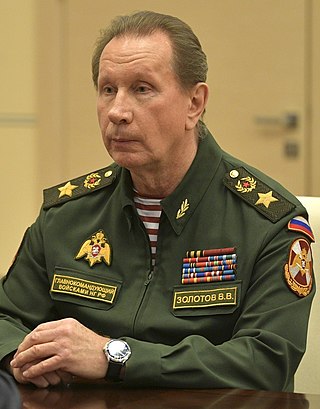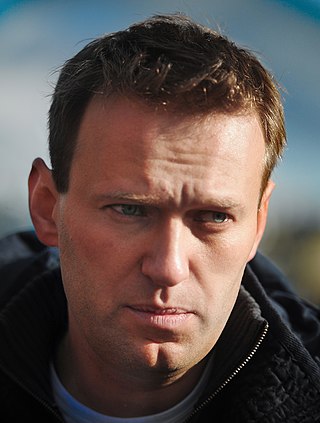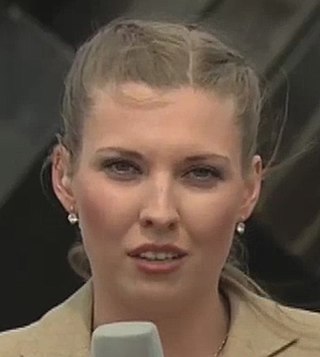
Sergey Vladilenovich Kiriyenko is a Russian politician who has served as First Deputy Chief of Staff of the Presidential Administration of Russia since 5 October 2016. He previously served as the 30th Prime Minister of Russia from 23 March to 23 August 1998 under President Boris Yeltsin, and was head of the Rosatom nuclear energy company between 2005 and 2016. Kiriyenko was the youngest Prime Minister of Russia, taking the position at age 35. Ideologically a technocrat, he has played a leading role in the governance of Russian-occupied territories of Ukraine since the Russian invasion of Ukraine.

The Autonomous Action is a revolutionary anarchist federation in Russia, Belarus and Ukraine that was founded in January 2002.

The ribbon of Saint George is a Russian military symbol consisting of a black and orange bicolour pattern, with three black and two orange stripes. It appears as a component of many high military decorations awarded by the Russian Empire, the Soviet Union and the current Russian Federation.
The System for Operative Investigative Activities is the technical specification for lawful interception interfaces of telecommunications and telephone networks operating in Russia. The current form of the specification enables the targeted surveillance of both telephone and Internet communications. Initially implemented in 1995 to allow access to surveillance data for the FSB, in subsequent years the access has been widened to other law enforcement agencies.

Viktor Vasilyevich Zolotov is a Russian military officer who is the Director of the National Guard (Rosgvardiya) and a member of the Security Council. Zolotov is a former bodyguard to former President Boris Yeltsin, former St. Petersburg Mayor Anatoly Sobchak, and current Russian leader Vladimir Putin. While working for Sobchak, Zolotov became acquainted with Putin, as well as figures in the St. Petersburg criminal underworld. A member of Putin's siloviki inner circle, Zolotov's rise to power and wealth happened after he became a close Putin confidante. The Zolotov family has obtained valuable land plots through dubious means.
Political repression of cyber-dissidents is the oppression or persecution of people for expressing their political views on the Internet.

The Soviet Story is a 2008 documentary film about Soviet Communism and Soviet–German relations before 1941 and after, written and directed by Edvīns Šnore, and sponsored by the right-wing Union for Europe of the Nations group in the European Parliament. The film features interviews with Western and Russian historians such as Norman Davies and Boris Vadimovich Sokolov, the Russian writer Viktor Suvorov, the Soviet dissident Vladimir Bukovsky, members of the European Parliament, and participants and survivors of the Soviet terror. Sokolov later emphasized that he simply offered expert advice and told Šnore that some of the things he claimed were based on obvious falsifications.

Corruption is perceived as a significant problem in Russia, impacting various aspects of life, including the economy, business, public administration, law enforcement, healthcare, and education. The phenomenon of corruption is strongly established in the historical model of public governance, and attributed to general weakness of rule of law in the country. Transparency International stated in 2022, "Corruption is endemic in Russia" and assigned it the lowest score of any European country in their Corruption Perceptions Index for 2021. It has, under the regime of Vladimir Putin, been variously characterized as a kleptocracy, an oligarchy, and a plutocracy; owing to its crony capitalism economic system.

Alexei Anatolievich Navalny is a Russian opposition leader, lawyer, anti-corruption activist and a political prisoner. He has organised anti-government demonstrations and run for office to advocate reforms against corruption in Russia, and against President Vladimir Putin and his government. Navalny was a Russian Opposition Coordination Council member. He is the leader of the Russia of the Future party and founder of the Anti-Corruption Foundation (FBK). He is recognised by Amnesty International as a prisoner of conscience, and was awarded the Sakharov Prize for his work on human rights.

In Russia, internet censorship is enforced on the basis of several laws and through several mechanisms. Since 2012, Russia maintains a centralized internet blacklist maintained by the Federal Service for Supervision of Communications, Information Technology and Mass Media (Roskomnadzor).

The Yarovaya law, also Yarovaya package/bag, is a set of two Russian federal bills, 374-FZ and 375-FZ, passed in 2016. The bills amend previous counter-terrorism laws and separate laws which regulate additional counter-terror and public safety measures. The public names the law after the last name of one of its creators—Irina Yarovaya.

Anton Borisovich Nossik was a Russian journalist, social activist and blogger. Sometimes he is called one of the godfathers of the Russian Internet or the first Russian-language blogger. He was an editor for the Russian online news publications Vesti.ru, Lenta.ru, Gazeta.ru and NEWSru.com.

The Anti-Corruption Foundation is a non-profit organization established in 2011 by Russian opposition figure Alexei Navalny. The FBK published investigations into alleged corruption by high-ranking Russian government officials. The organisation was funded by private donations.
The Russian opposition figure and anti-corruption activist Alexei Navalny announced his intention to run for President of Russia in the 2018 election on 13 December 2016. The primary themes of his campaign have been focusing on domestic issues, including combating corruption in Russia and improving the economy. Commentators have noted that Navalny's campaign is unprecedented in modern Russia as politicians usually do not start campaigning until a few months before the election.
During Ukraine's post-Soviet history, the far-right has remained on the political periphery and been largely excluded from national politics since independence in 1991. Unlike most Eastern European countries which saw far-right groups become permanent fixtures in their countries' politics during the decline and the Dissolution of the Soviet Union in 1991, the national electoral support for far-right parties in Ukraine only rarely exceeded 3% of the popular vote. Far-right parties usually enjoyed just a few wins in single-mandate districts, and no far right candidate for president has ever secured more than 5 percent of the popular vote in an election. Only once in the 1994–2014 period was a radical right-wing party elected to the parliament as an independent organization within the proportional part of the voting: Svoboda in 2012. Since then far-right parties have failed to gain enough votes to attain political representation, even at the height of nationalist sentiment during and after Russia's annexation of Crimea and the Russo-Ukrainian War.

Olga Vladimirovna Skabeyeva or Skabeeva is a Russian television presenter, political commentator, and propagandist. Skabeyeva received the nickname "Iron Doll of Putin TV" due to her criticism of the Russian opposition.
The European Parliament resolution of 19 September 2019 on the importance of European remembrance for the future of Europe was a resolution of the European Parliament adopted on 19 September 2019 with 535 votes in favor, 66 against, and 52 abstentions, which called for remembrance of totalitarian crimes and condemned propaganda that denies or glorifies totalitarian crimes, and linked such propaganda to Russian information warfare against "democratic Europe."

"On conducting a special military operation" was a televised broadcast by Russian president Vladimir Putin on 24 February 2022, announcing the Russian invasion of Ukraine.

Boris Dmitrievich Zimin is a Russian businessman and public figure, philanthropist, motor sportsman. The son of Dmitry Zimin, (1933-2021), the founder of VimpelCom company. Boris Zimin is involved with the Zimin Foundation, which finances and supports Russian non-profit educational projects in the field of education, protection of human rights and freedom of speech, as well as scientific research in the field of natural sciences.

Grandpa in his bunker, also translated as grandpa in a bunker, or bunker grandpa, is an insulting nickname for Russian president Vladimir Putin, which has become an Internet meme in Russia and Ukraine.














